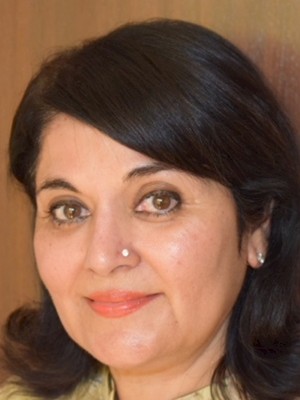Room 004, School of Arts and Sciences
Central Campus

For seventy years, the Partition of India had remained a hugely traumatic event in the memories of the millions who had experienced it. It had led to the largest displacement and migration in human history — but there was no space anywhere in the world to commemorate it. Unlike the holocaust, the apartheid and even the bombing of Hiroshima — there was no attempt anywhere to document the events of 1947. In 2015, Kishwar Desai set up a small NGO to create the first Partition Museum at the Town Hall in Amritsar, which is now internationally recognised, for the 70th anniversary on the Partition of India.
The second Museum in the world, on the Partition of India, has now been set up at the Dara Shukoh Library in Delhi for the 75th anniversary of the event. Both the museums which receive a large number of visitors have been set up entirely through donations of Partition survivors, their families and others. These are both people’s museums — with oral histories, objects carried across the border in 1947— and a large number of documents and photographs gathered from all over the world. It has been a challenge to set these and up and to operate and maintain them.
This talk gives the back story of how these award-winning museums were set up and are being managed still by the small NGO, The Arts And Cultural Heritage Trust.
Article in Print
As an author, her sixth book: “The Longest Kiss: The Life and Times of Devika Rani,” recently received an award from the President of India for the best book on Indian Cinema at the National Film Awards, and is being made into a feature film by a leading studio. Her debut novel ‘Witness the Night” won the Costa Award for the Best first novel in the UK and Ireland.Following that she wrote a trilogy featuring Simran Singh, a social worker turned detective. “Witness the Night” is also under discussion for a feature film, as is her first non fiction book on Indian cinema, “Darlingji” .
Apart from cinema history, she has been working on colonial history as well and her book “ Jallianwala Bagh, 1919: The Real Story” won critical acclaim, and led to exhibitions in India, UK and New Zealand at the centenary of the massacre.
She is the Chair of The Arts And Cultural Heritage Trust that set up the world’s first Partition Museum, at the historic Town Hall, Amritsar, and won seven awards. The Trust has now set up the second Partition Museum at the Dara Shukoh Library in old Delhi. These are people’s museums, created entirely through donations, and contain documents, memorabilia and material from the Partition of India in 1947, which impacted more than 20 million in the world’s largest migration.
She also helped to set up the statue of Mahatma Gandhi outside Westminster in the UK.
As a playwright, her play “Devika Rani, Goddess of the Silver Screen” has received standing ovations everywhere that it was staged. Her first play “Manto!” on the life and times of Saadat Hasan Manto won the TAG-Omega award.
Before turning author and playwright, Kishwar worked in print journalism and then moved onto television as an anchor/producer for over twenty years. She ran her own production house and even set up and ran a TV channel, and her last full time job was as Vice President, Zee Telefilms.
For the past ten years, she has been working on various aspects of colonial history and examining areas which have an impact both in the UK and India. She is at present working on a historical biography, set in the UK and India.
She has been awarded and recognised for her work in art, history and literature both in the UK and in India.